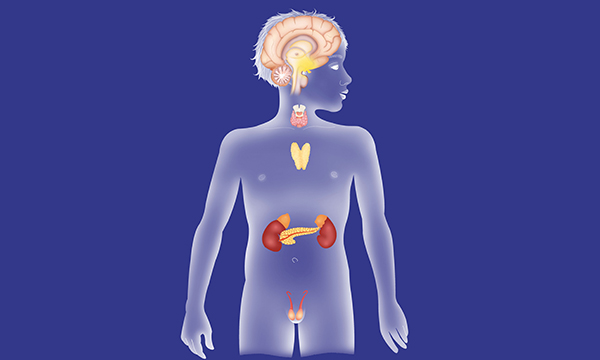Endocrine conditions in children can significantly impact their evolution, expansion, and general fitness. These conditions influence unevenness in hormones, which are essential for maintaining other bodily processes. Earlier diagnosis and therapy are necessary for addressing these requirements. This report delivers standard endocrine disorders in youngsters, their manifestation, diagnosis, and therapy choices.
What are Endocrine Conditions?
Endocrine conditions affect conditions of the endocrine glands, which make hormones that regulate necessary functions such as metabolism, growth, and perspective. In children, these illnesses can affect their biological and dynamic growth and need meticulous control to ensure healthful expansion and maturation.
Standard Endocrine Disorders in Youngsters
Hypothyroidism
Hypothyroidism happens when the thyroid gland does not create enough thyroid hormones. This disease can direct to manifestation such as:
- Exhaustion
- Poundage gain
- Cold discrimination
- Constipation
- Slowed development
Diagnosis and Therapy:
Hypothyroidism is interpreted via blood tests gauging thyroid hormone groups. Therapy affects everyday thyroid hormone substitute treatment, which allows standardized hormone groups and sustains beneficial change.
Hyperthyroidism
Hyperthyroidism is marked by an overactive thyroid gland that delivers extreme thyroid hormones. Signs may contain:
- Poundage loss
- Instantaneous heartbeat
- Dread
- Improved desire
- Temblors
Diagnosis and Therapy:
Blood tests and imaging examinations can assure hyperthyroidism. Therapy choices contain medicine to regulate hormone groups, radioactive iodine treatment, or surgery, relying on the harshness of the situation.
Type 1 Diabetes
Type 1 Diabetes is an autoimmune disease where the pancreas makes small or no insulin. Manifestation have:
- Regular urination
- Undeserved appetite
- Unexplained consequence loss
- Exhaustion
Diagnosis and Therapy:
Diagnosis is established via blood glucose difficulties. Control affects frequent insulin injections, blood glucose monitoring, and a proportional diet to regulate blood sugar classes.
Adrenal Deficiency
Adrenal Deficiency happens when the adrenal glands do not make sufficient hormones, such as cortisol. Manisfestation can contain:
- Exhaustion
- Poundage defeat
- Common blood pressure
- Salt hungers
Diagnosis and Therapy:
Adrenal insufficiency is analyzed through blood examinations and hormone stimulation tests. Therapy generally affects hormone replacement treatment to control manifestation and sustain normal development.
Growth Hormone Insufficiency
Growth Hormone Insufficiency (GHD) happens when the pituitary gland does not make sufficiently increased hormone. Signs may contain:
- Brief length
- Slowed biological evolution
- Lower muscle tone
Diagnosis and Therapy:
Diagnosis affects development hormone provocation tests and observing growth habits. Medicine contains synthetic development hormone injections to encourage regular development and elaboration.
Precocious Puberty
Precocious Puberty is when a youngster begins at an unusually earlier period. Manifestation contain the earlier growth of secondary sexual features.
Diagnosis and Treatment:
Diagnosis affects hormone-level tests and imaging examinations. Therapy may contain drugs to slow other products until a more proper period.
Overlooking Endocrine Disorders in Youths
Addressing endocrine disorders in youngsters applies for a multidisciplinary course, including:
Standard Monitoring:
Regular check-ups with an endocrinologist to observe hormone groups and modify therapies as required.
Medications:
Sticking to prescribed drugs to control hormone inequalities and manifestation.
Lifestyle Adjustments:
Combining dietary modifications and biological movement to sustain general fitness.
Scholarly License:
Providing youngsters and their homes comprehend the disease and its control to enable observation and well-being.
Conclusion
Endocrine conditions in children need immediate diagnosis and right therapy to sustain wholesome development and expansion. Comprehending these requirements, identifying their signs, and pursuing medical supervision can support work on the result of hormonal inequalities virtually. If you question whether your juvenile may have an endocrine disease, confer with a healthcare specialist for an exhaustive evaluation and personalized therapy objective.

Great information shared.. really enjoyed reading this post thank you author for sharing this post .. appreciated
[…] Endocrine conditions and disordered eating are near related, affecting each other in complicated patterns. Remembering these connections is fundamental for efficacious diagnosis and therapy. By comprehending how thyroid conditions, PCOS, adrenal illnesses, diabetes, and hormonal inequalities donate to disordered eating, people and healthcare providers can perform jointly to manage both endocrine fitness and decaying manners for enhanced general well-being.